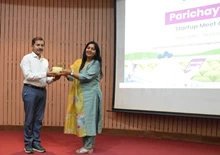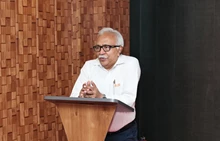
Several forests have been cut down in the name of development by companies and governments alike, affecting tribal populations as well as local wildlife and flora around the country. However, one engineer from Kerala stands out.
However, there is one exception: a Kerala engineer. Nellikkuzhi Kuriakkose Kurian has created a man-made oasis with money from his pocket in Ayamkudy, a hamlet in the Kottayam district of state.
For the last three years, the Mango Meadows Agriculture Pleasure Land, a biodiversity park, has been a favorite destination for visitors and tourists seeking to refresh in the midst of nature, free of pollution.
Nellikkuzi never intended to establish a park for touristic purposes when he started. "I just wanted to do my part to help the environment," he tells media.
Nellikkuzhi Kuriakkose Kurian: The engineer who worked for a Greater cause
Nellikkuzi, a Kaipuzha native, began her career as an engineer supervising construction sites in Mumbai. He came to Saudi Arabia in 1995, at the age of 26, to work as a site engineer for a construction company. He relocated to Dubai three years later to work in the aluminum fabrication sector.
"I made a good living and finally utilized my funds to establish my own company." "I was visiting a location one day when I stumbled upon a man-made oasis in the middle of the desert," the 50-year-old recalls.
During a visit to India in 2002, Nellikkuzi purchased a 5-acre barren property in Ayamkudy village to pursue the endeavor. "There were four coconut trees on the property, and the rest was barren." "Nearby farmers said that nothing will ever grow on the barren area," he says.
He began investing money in native tree planting and traveled to remote parts of the country. He gradually acquired neighboring land over the years.
However, as his crops grew in size, Nellikkuzi began to face difficulties. "Because I resided in Dubai, managing the plants in India was a challenging chore." Every time I went back to the land, I saw that I had lost a lot of trees. "So I recruited people to water and manage the plantation," he explains.
Nellikkuzi had bought 30 acres of land about a decade later. "By that time, it had become impossible to keep up with the upkeep of such a vast property." "In 2009, I decided to give up my business and devote my finances and life to the development of the forest," he says.
Today, the green haven is home to 4 lakh trees, 4,800 plant species, 85 vegetable kinds, and 145 fruit trees, including plum, cherry, Israel orange, and others. "The Biodiversity Park contains all possible kinds from the south and other regions of India, such as rhododendron arboreum, which grows below 5 degrees Celsius, and date palm, which grows between 45 and 50 degrees Celsius," he explains.
Other uncommon plant varieties and trees found in the area include Aegle marmelos, which are considered sacred and utilized for medicinal purposes. "I've also planted a rare species, ficus alii, which is on the verge of extinction, as well as other varieties like calabash or beggar's bow, rudraksha, and others," he explains.
He claims that not all of the varieties he grows are edible. "However, my ultimate goal is to rescue as many plant species as possible from extinction," he continues.
Mini-forest and an eco-friendly Homestay
According to Nellikkuzi, he began cultivating the land to build a mini-forest, but it soon evolved into an eco-friendly homestay.
"To monitor and manage the plantations, I built a farmhouse." "However, many friends and family began to visit the region in search of quiet and to spend some time away from the city rush," he continues.
Nellikkuzi opened his biodiversity park to the public as the number of tourists grew. Aside from flora, the park has go-karting, cable cars, a swimming pool, boating and boat safaris, ropeway, archery, a restaurant, a lodge, and much more.
He has no regrets after spending millions of dollars building the land. "Research students and scientists from all across India have visited my biodiversity park to study plant species." It demonstrates that I was successful in my aim of saving and protecting rare varieties," he says.
Nellikkuzi believes that his biodiversity park would assist future generations to grasp the country's biodiversity heritage. "A significant number of children go to the park, but they have no idea where their food comes from." They are aware of the delicacy offered on their dish but are less conscious of the process it goes through before it reaches the plate. "I hope to work together with them to protect the biodiversity heritage," he says.











